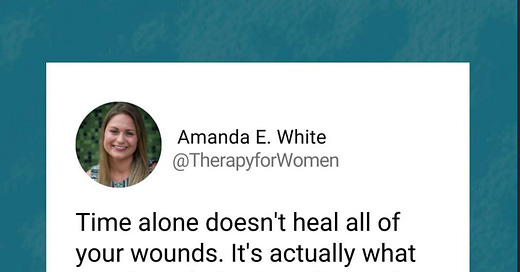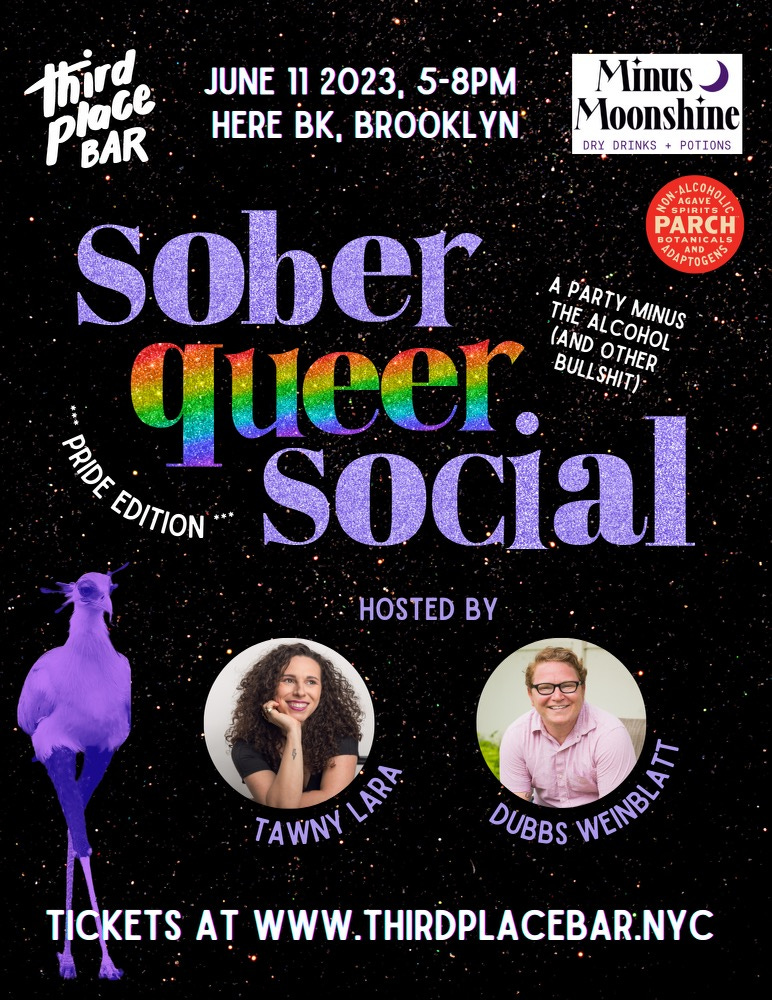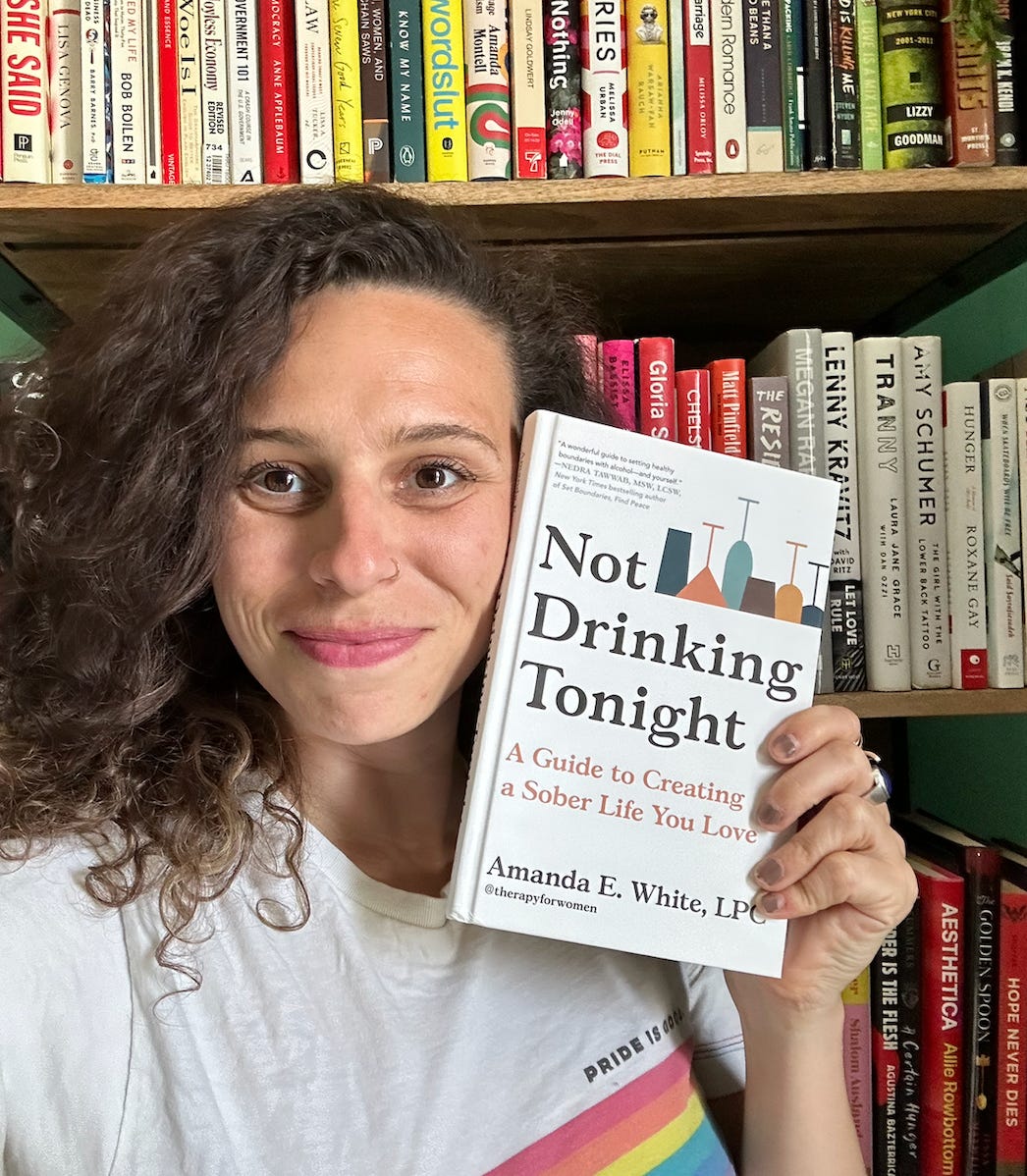Author Interview: Your Fave Instagram Therapist (Part 1)
Amanda E. White, LPC, talks liquid courage, healthy relationships, and productive fighting
Hey, y’all! Welcome to this paid subscriber-only edition of Beyond Liquid Courage. In addition to my free weekly column, where I answer subscriber questions about alcohol-free dating, intimacy, and relationships, these paid issues dive deeper into my life as a writer and provide resources to support you on your dry humping journey (wink wink).
Before we dive into Amanda’s interview, I want to let y’all know that I’m co-hosting a sober pride event on June 11th in Brooklyn! Grab your ticket here.
This bonus issue includes an interview with your favorite Instagram Therapist, Amanda E. White, LPC. You might already be one of the half a million people who follow her on Instagram, or have a copy of her incredible book, Not Drinking Tonight A Guide to Creating a Sober Life You Love. (And if not, what are you waiting for?!)
Amanda’s insight is particularly valuable because she has her own sobriety journey in addition to being a therapist who focuses on substance use disorder. I interviewed her for my book, Dry Humping: A Guide to Dating, Relating, and Hooking Up Without the Booze, and I wanted to share some of her wisdom here as a special preview.
This interview was condensed and edited for clarity.
How can someone boost their confidence in early sobriety or sober curiosity?
There's a very specific erosion of self-esteem that happens if you're constantly breaking promises to yourself. For example, I would tell myself every day I was not going to drink again. And when you are in the habit of saying all these things to yourself and then breaking all these promises, you don't learn to trust your own word. It's really, really important in early sobriety that people are careful with the promises they're making to themselves. It’s helpful to start with small goals and slowly build confidence over time. Underpromise yourself and over-deliver so that you can start to rebuild that trust in yourself.
How would you define liquid courage?
Alcohol doesn't actually give you courage; it just shuts off the part of your brain that has reasonable concern about things. It numbs the part of ourselves that is worried about other people or concerned about whether we'll look stupid. So the problem is, when you use alcohol to feel courageous, you are not actually developing the skill because you are just numbing the part of you that is doubtful.
The way to actually have courage is to do things in the face of hardship, not to eliminate the concern over hardship. Real courage comes from doing something when you're scared. Alcohol is a shortcut that just makes things temporarily easier, but it doesn't actually teach you the skill of how to do something hard.
When you use alcohol to feel courageous, you are not actually developing the skill because you are just numbing the part of you that is doubtful. - Amanda E. White, LPC
What's the difference between courage and confidence?
I think courage is doing something in the face of difficulty and doing it anyway. It's a hard thing, it's a scary thing, and you're doing it anyway. It can create confidence; confidence is knowing that you will be able to do it. So to me, acting courageously produces confidence.
What are your thoughts on AA’s rule of waiting one year to date and hook up?
There's so much morality still tied up in the wait-one-year rule. I think if you have an addictive pattern of dating and getting into unhealthy relationships and you use sex in an unhealthy way, I get it. But it's so personal. One year isn't magic. It's not like you wake up after a year and everything is better. It's more about doing the opposite of what you did in your active addiction than focusing on the time frame. Notice what your patterns are and try to take action that's in alignment with your values.
The first chapter of my book is all about the perks of dating yourself in early sobriety or sober curiosity. How does spending time alone ultimately help someone become a better partner?
You can't know how you need a partner to show up for you or how they can support you if you don't even know how to support yourself. I think one of the most important things with someone dating themselves in early sobriety is learning how to have alone time and be comfortable in their own presence. They get more acquainted with what their stuff is.
If you want a really good relationship, practice being by yourself. Because then when you get into a relationship, if you're mad at your partner or you get triggered, you're way more familiar with why you're being triggered, and then you can explain it to your partner versus most people who never go on a self-help or a healing journey. They're kind of just walking around, projecting their stuff on others, getting triggered, not knowing why.
For years I only met dates and partners in bars, so the idea of a healthy relationship with clear communication seemed so foreign to me in early sobriety. What does a healthy relationship look like?
That's a good question. Healthy relationships are based on qualities like honesty, trust, open communication, respect, and equality. Can you be honest with your partner? Can you tell them something that's hard, and they don't respond by belittling you, shaming you, or being mean to you? I think what makes most relationships unhealthy is miscommunication.
Want more of this interview? Stay tuned for part 2 next week when Amanda and I discuss what happens after sober or sober curious dating: booze-free intimacy, mindful breakups, healthy fights, and building long-term relationships
If Amanda’s interview interests you, her insight is sprinkled throughout my book, Dry Humping: A Guide to Dating, Relating and Hooking Up Without The Booze. Preorder now on Bookshop.org (every purchase helps to support a local bookstore) or your favorite retailer.
Until next time,
P.S. This issue was edited by Irina Gonzalez.







